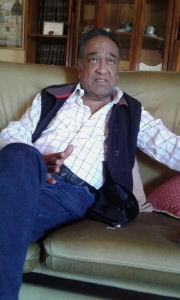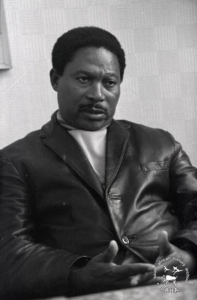
The Sunday Mail

Mr Ronnie Patel was one of the first Indians in the then Southern Rhodesia to take up arms alongside black nationalists to fight the colonial regime. He was in the Zapu office in 1977 when national hero Cde Jason Ziyaphapha Moyo was killed by a letter bomb, and damaged an eardrum in that attack. Last week, Zimpapers journalists Kuda Bwititi and Robin Muchetu spoke to Mr Patel in Bulawayo. This is his story.
* * *
Cde Ronnie Patel

Mr Ronnie Patel
I was born in 1947 and spent my early years in Dete, Matabeleland North.
At 17-years-old, my political inclination grew stronger, leading me to become a branch member of Zapu. It was at one of our meetings in Dingani that I met the party leadership, including Dr Joshua Nkomo with whom I later developed a close relationship.
This was in the 1960s and Zapu was very popular, though doing most of its work surreptitiously to keep the Rhodesians off its back.
But we couldn’t hide forever.
The British South Africa Police gathered intelligence on our activities and were onto us in a jiffy.
I got wind of their plan to arrest and possibly kill us, so I then told a colleague named Moyo that fleeing was the best option under the circumstances.
I fled to Botswana, only to be told later that Moyo had been picked up, never to be seen again.
The Rhodesian police hunted me relentlessly, even detaining my father for a couple of days. It took the spirited efforts of my friend (the late Justice) Walter Sensole for them to release my ol’ man.
In the meantime, I continued working for Zapu in Francistown, Botswana. I lived there for only a while, though, as tensions were building up after the Rhodesians had killed Ethan Dube.
The party subsequently dispatched me to the capital, Gaborone, where I spent some months before Dumiso Dabengwa came to strategise our next deployment.
From Gaborone we flew to Lusaka, Zambia on a chartered plane commonly referred to as Wenela.
Wenela was a company that used to recruit Zambians and Malawians to work in mines, and used to offer its planes to Zapu.
We had no money for isitshebo (relish) on our first day in Lusaka, so our treasurer, Steven Vuma, gave us some kwachas to purchase cabbages. The sadza was cooked in drums.
Some people at Zimbabwe House (Zapu’s headquarters in Lusaka) were amused when our cabbages arrived. I later caught the drift: They couldn’t fathom an Indian lining up for sadza!
I was the only one and therefore became noticeable immediately.
One of my tasks in Zambia was receiving ammunition that was being provided by the Russians. Among those I worked with were Lookout Masuku and Saul Gwakuba Ndlovu, the man in charge of Zapu’s magazine.
There was also a guy in the communications department known as Fleming. Once, we received military trucks from the Russians via MPLA of Angola and the Cubans.
The Cubans got lost in Northern Zambia, so we went to look for them and spent three days searching. We ran out of diesel, but managed to get to Zimbabwe House.
That was one of the moments when one nearly came to their wits’ end.
JZ Moyo death

Cde Jason Moyo
I was there when the Rhodesians tried to hit Zimbabwe House.
Nikita Mangena used to live there, while Joseph Msika, George Silundika, Naison Kutshwekhaya Ndlovu and I lived at a house in Lilanda Township with about 11 others.
It was life as usual in that house. I was the only Indian, but trust me, we were a united people.
My worst experience of the liberation struggle was the assassination of JZ Moyo. I remember that day vividly. We were about to start a meeting with (Dumiso) Dabengwa, (Joseph) Msika, (George) Silundika, John (landa) Nkomo, Jane Ngwenya, Amos Ngwenya, Sikhuli Moyo and others present. Our offices were near a market in the city centre. The place was more like a warehouse that had been partitioned to come up with offices.
JZ had received an envelope and was holding it close to his stomach. Suddenly, that envelope exploded, blowing him up.
I was in the next office and ran out with others after the thunderous explosion.
A fire started as we escaped and I could see JZ lying on the floor with his stomach ripped open. The sight was horrific.
It is never pleasant to see another human being die. I watched him die. He wouldn’t have survived as the blast was terrible.
I lost one eardrum to that explosion and only use the other now.
John Nkomo was also injured and I am the one who took him to hospital.
The place was unpleasant to see. The wooden office partitions had crumbled and were like dust.
JZ was no more.
Helping hand
I later went to Russia to provide logistical support to Zapu from there, returning to independent Zimbabwe in 1983.
A number of other Indians participated in the liberation struggle, the likes of Mr AB Naik who was at Gonakudzingwa Detention Centre with Dr Joshua Nkomo. He now lives in Gwanda.
Mr BC Naik, Mr RK Naik and Mr Desai also figure in that group, while others are now late.
Indian businesspeople in Bulawayo also helped the struggle financially.
There was a Mr Mehta in Harare who was to become Zimbabwe’s first High Commissioner to Canada.
Professor (Hasu) Patel worked closely with Zanu and President Mugabe, and is now with the University of Zimbabwe. He was once the Ambassador to Australia. Others who were based in the Midlands also helped.
As I reflect on our 36 years of majority rule, I am content with myself and how I assisted the country.
The best moments of the struggle that I cherish the most remain the friendships I made then.
Nothing can take that away. I am still very close to those who are still alive.
We loved each other because we were all fighting for a common cause which was independence.
We need to go back to those days when people were all united to achieve common goals.



